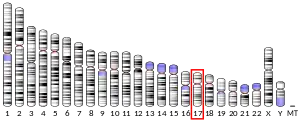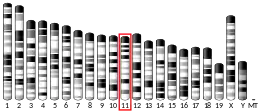DLX3
Homeobox protein DLX-3 is a protein that in humans is encoded by the DLX3 gene.[5][6]
Function
Dlx3 is a crucial regulator of hair follicle differentiation and cycling. Dlx3 transcription is mediated through Wnt, and colocalization of Dlx3 with phospho-SMAD1/5/8 is involved in the regulation of transcription by BMP signaling.[7] Dlx3 transcription is also induced by BMP-2 through transactivation with SMAD1 and SMAD4.[8]
Many vertebrate homeo box-containing genes have been identified on the basis of their sequence similarity with Drosophila developmental genes. Members of the Dlx gene family contain a homeobox that is related to that of Distal-less (Dll), a gene expressed in the head and limbs of the developing fruit fly. The Distal-less (Dlx) family of genes comprises at least 6 different members, DLX1-DLX6. This gene is located in a tail-to-tail configuration with another member of the gene family on the long arm of chromosome 17.[6]
Clinical significance
Mutations in this gene have been associated with the autosomal dominant conditions trichodentoosseous syndrome (TDO) and amelogenesis imperfecta with taurodontism.[6]
References
- GRCh38: Ensembl release 89: ENSG00000064195 - Ensembl, May 2017
- GRCm38: Ensembl release 89: ENSMUSG00000001510 - Ensembl, May 2017
- "Human PubMed Reference:". National Center for Biotechnology Information, U.S. National Library of Medicine.
- "Mouse PubMed Reference:". National Center for Biotechnology Information, U.S. National Library of Medicine.
- Scherer SW, Heng HH, Robinson GW, Mahon KA, Evans JP, Tsui LC (Aug 1995). "Assignment of the human homolog of mouse Dlx3 to chromosome 17q21.3-q22 by analysis of somatic cell hybrids and fluorescence in situ hybridization". Mamm Genome. 6 (4): 310–1. doi:10.1007/BF00352432. PMID 7613049. S2CID 3088522.
- "Entrez Gene: DLX3 distal-less homeobox 3".
- Hwang J, Mehrani T, Millar SE, Morasso MI (September 2008). "Dlx3 is a crucial regulator of hair follicle differentiation and cycling". Development. 135 (18): 3149–59. doi:10.1242/dev.022202. PMC 2707782. PMID 18684741.
- Park GT, Morasso MI (January 2002). "Bone morphogenetic protein-2 (BMP-2) transactivates Dlx3 through Smad1 and Smad4: alternative mode for Dlx3 induction in mouse keratinocytes". Nucleic Acids Res. 30 (2): 515–22. doi:10.1093/nar/30.2.515. PMC 99823. PMID 11788714.
Further reading
- Morasso MI, Radoja N (2005). "Dlx Genes, p63, and Ectodermal Dysplasias". Birth Defects Res. C Embryo Today. 75 (3): 163–71. doi:10.1002/bdrc.20047. PMC 1317295. PMID 16187309.
- Bonaldo MF, Lennon G, Soares MB (1997). "Normalization and subtraction: two approaches to facilitate gene discovery". Genome Res. 6 (9): 791–806. doi:10.1101/gr.6.9.791. PMID 8889548.
- Nakamura S, Stock DW, Wydner KL, et al. (1997). "Genomic analysis of a new mammalian distal-less gene: Dlx7". Genomics. 38 (3): 314–24. doi:10.1006/geno.1996.0634. PMID 8975708.
- Price JA, Bowden DW, Wright JT, et al. (1998). "Identification of a mutation in DLX3 associated with tricho-dento-osseous (TDO) syndrome". Hum. Mol. Genet. 7 (3): 563–9. doi:10.1093/hmg/7.3.563. PMID 9467018.
- Roberson MS, Meermann S, Morasso MI, et al. (2001). "A role for the homeobox protein Distal-less 3 in the activation of the glycoprotein hormone alpha subunit gene in choriocarcinoma cells". J. Biol. Chem. 276 (13): 10016–24. doi:10.1074/jbc.M007481200. PMID 11113121.
- Park GT, Denning MF, Morasso MI (2001). "Phosphorylation of murine homeodomain protein Dlx3 by protein kinase C". FEBS Lett. 496 (1): 60–5. doi:10.1016/S0014-5793(01)02398-5. PMC 1283141. PMID 11343707.
- Peng L, Payne AH (2002). "AP-2 gamma and the homeodomain protein distal-less 3 are required for placental-specific expression of the murine 3 beta-hydroxysteroid dehydrogenase VI gene, Hsd3b6". J. Biol. Chem. 277 (10): 7945–54. doi:10.1074/jbc.M106765200. PMID 11773066.
- Sumiyama K, Irvine SQ, Stock DW, et al. (2002). "Genomic structure and functional control of the Dlx3-7 bigene cluster". Proc. Natl. Acad. Sci. U.S.A. 99 (2): 780–5. Bibcode:2002PNAS...99..780S. doi:10.1073/pnas.012584999. PMC 117382. PMID 11792834.
- Strausberg RL, Feingold EA, Grouse LH, et al. (2003). "Generation and initial analysis of more than 15,000 full-length human and mouse cDNA sequences". Proc. Natl. Acad. Sci. U.S.A. 99 (26): 16899–903. Bibcode:2002PNAS...9916899M. doi:10.1073/pnas.242603899. PMC 139241. PMID 12477932.
- Imabayashi H, Mori T, Gojo S, et al. (2003). "Redifferentiation of dedifferentiated chondrocytes and chondrogenesis of human bone marrow stromal cells via chondrosphere formation with expression profiling by large-scale cDNA analysis". Exp. Cell Res. 288 (1): 35–50. doi:10.1016/S0014-4827(03)00130-7. PMID 12878157.
- Holland MP, Bliss SP, Berghorn KA, Roberson MS (2004). "A role for CCAAT/enhancer-binding protein beta in the basal regulation of the distal-less 3 gene promoter in placental cells". Endocrinology. 145 (3): 1096–105. doi:10.1210/en.2003-0777. PMID 14670999.
- Haldeman RJ, Cooper LF, Hart TC, et al. (2005). "Increased bone density associated with DLX3 mutation in the tricho-dento-osseous syndrome". Bone. 35 (4): 988–97. doi:10.1016/j.bone.2004.06.003. PMID 15454107.
- Gerhard DS, Wagner L, Feingold EA, et al. (2004). "The Status, Quality, and Expansion of the NIH Full-Length cDNA Project: The Mammalian Gene Collection (MGC)". Genome Res. 14 (10B): 2121–7. doi:10.1101/gr.2596504. PMC 528928. PMID 15489334.
- Dong J, Amor D, Aldred MJ, et al. (2005). "DLX3 mutation associated with autosomal dominant amelogenesis imperfecta with taurodontism". Am. J. Med. Genet. A. 133 (2): 138–41. doi:10.1002/ajmg.a.30521. PMID 15666299. S2CID 8482065.
- Islam M, Lurie AG, Reichenberger E (2006). "Clinical features of tricho-dento-osseous syndrome and presentation of three new cases: an addition to clinical heterogeneity". Oral Surgery, Oral Medicine, Oral Pathology, Oral Radiology, and Endodontics. 100 (6): 736–42. doi:10.1016/j.tripleo.2005.04.017. PMID 16301156.
- Otsuki T, Ota T, Nishikawa T, et al. (2007). "Signal sequence and keyword trap in silico for selection of full-length human cDNAs encoding secretion or membrane proteins from oligo-capped cDNA libraries". DNA Res. 12 (2): 117–26. doi:10.1093/dnares/12.2.117. PMID 16303743.
- Morsczeck C (2006). "Gene expression of runx2, Osterix, c-fos, DLX-3, DLX-5, and MSX-2 in dental follicle cells during osteogenic differentiation in vitro". Calcif. Tissue Int. 78 (2): 98–102. doi:10.1007/s00223-005-0146-0. PMID 16467978. S2CID 7621703.
- Berghorn KA, Clark-Campbell PA, Han L, et al. (2006). "Smad6 represses Dlx3 transcriptional activity through inhibition of DNA binding". J. Biol. Chem. 281 (29): 20357–67. doi:10.1074/jbc.M603049200. PMID 16687405.
External links
- DLX3+protein,+human at the US National Library of Medicine Medical Subject Headings (MeSH)
- Overview of all the structural information available in the PDB for UniProt: O60479 (Homeobox protein DLX-3) at the PDBe-KB.
This article incorporates text from the United States National Library of Medicine, which is in the public domain.



